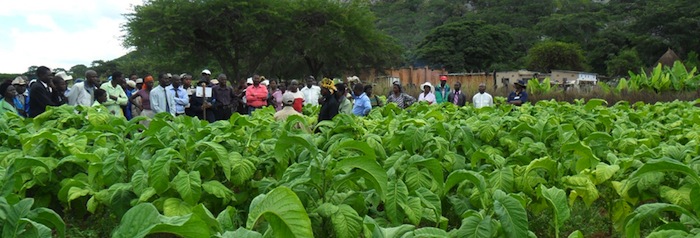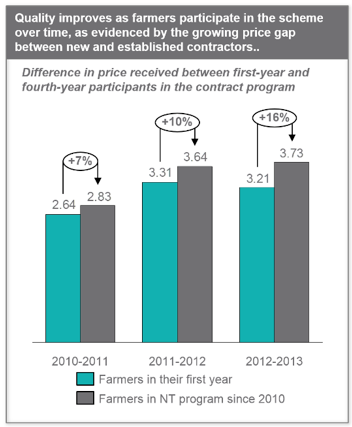Case Study : ‘Digging in’ or ‘building out’ to benefit farmers and buyers in outgrower schemes?
Reminder: Join us for a live Google Hangout discussion with Will Warshauer, TechnoServe’s new president and CEO, at noon EST, Friday October 3. All the details and a replay of the chat are here.
What can we learn from growing tobacco? Although TechnoServe does not work with the crop, nor do we intend to, it turns out there’s a lot we can glean from the successes of tobacco outgrower schemes.
As we discussed in part 1 of this blog series, outgrower schemes have the potential to meet several key sustainable agriculture objectives. To better understand how outgrower schemes can achieve mutually beneficial outcomes for both buyer and farmer, let’s take a look at a successful medium-sized model. We’ll also examine the implications for balancing breadth (number of farmers in a scheme) and depth (level of investment in individual farmers).
Again, while TechnoServe does not work in tobacco, we focused this research on tobacco production because of the high degree of sophistication often achieved by contract farming models in this sector. Northern Tobacco (NT), a subsidiary of the Rift Valley Company, operates an outgrower scheme in Zimbabwe with 3,000 to 4,000 smallholder farmers who supply approximately 25 percent of the company’s tobacco each year. The program has proven successful across a number of indicators, demonstrating benefits for both farmers and company, including:
- Generating $8.3 million annually in incremental smallholder income (i.e. aggregate net income beyond what smallholders would receive from production outside of the program, see Table 1);
- Enabling smallholder farmers to access $7.9 million in input and capital equipment financing each year;
- Facilitating a 30 percent increase in volume for NT’s business.

Table 1 (Source: TechnoServe analysis; data from TIMB and Northern Tobacco)
We found that NT’s ability to achieve these mutual benefits is driven by six factors related to program management and a strong enabling environment.
- Trust and accountability established between farmers and the company: NT field agents develop strong relationships with local community leadership, lead farmers and individual farmers through frequent in-person visits and by continuously soliciting their support and perspective. Accountability is reinforced through regular monitoring and reporting, and by requiring farmers to form farmer groups for program participation.
- Significant investment in farmer selection, training and monitoring: NT thoroughly vets farmers with community leadership and through Zimbabwe’s Tobacco Industry Marketing Board (TIMB) grower database prior to selection. Company field agents conduct group training sessions on each stage of production, followed by individual visits to inspect farmers’ crops, provide advice and report status back to the company.
- Effective use of incentives at all levels: NT field agents are incentivized with bonuses based on farmer yields, quality and loan repayment rates. Farmer loyalty is incentivized by providing high-performing farmers with larger input packages, access to capital equipment loans in addition to input loans, and additional training and prizes.
- Sophisticated program data system: NT has developed a centralized data system that tracks and monitors all aspects of the program, from input delivery to farmer data (e.g. yields, area planted, sales volume and value) to credit performance data (e.g. outstanding balances, repayment status and history). This data is analyzed and reviewed throughout the season to inform decision making and resource deployment, and to improve the program from year to year.
- Focus on depth over breadth: NT is increasingly focusing on developing a smaller group of committed smallholder farmers who can grow their businesses with NT support, rather than expanding across a large number of farmers.
- Effective tobacco marketing board: TIMB creates a strong enabling environment by providing effective regulation and valuable services. This includes farmer registration and assigning unique grower numbers, providing a single, centralized account for all farmer debt/payments, arbitrating disputes on the sales floor, and publishing daily price matrices based on international prices.

(Northern Tobacco, a subsidiary of the Rift Valley Company, operates an outgrower scheme in Zimbabwe with 3,000 to 4,000 smallholder farmers who supply approximately 25 percent of the company’s tobacco each year. Image credit: Northern Tobacco.)
Depth vs. breadth
Northern Tobacco’s decision to grow by digging in (i.e. deepening its support for a smaller number of farmers) rather than building out (i.e. scaling up to contract with more farmers), raises the question: which is the more effective approach for achieving mutual benefits?
 While building out enables the scheme to reach a greater number of farmers, digging in can facilitate transformative impact for farmers that can spread across families and communities. NT’s most loyal smallholders have multiplied their farm size while professionalizing their operations, investing in capital equipment and hiring staff from their local communities. NT has also seen commercial benefits from digging in, including improved quality [(as evidenced by higher prices for farmers, see Table 2 at right)] and yields from farmers who have participated in the scheme for multiple years.
While building out enables the scheme to reach a greater number of farmers, digging in can facilitate transformative impact for farmers that can spread across families and communities. NT’s most loyal smallholders have multiplied their farm size while professionalizing their operations, investing in capital equipment and hiring staff from their local communities. NT has also seen commercial benefits from digging in, including improved quality [(as evidenced by higher prices for farmers, see Table 2 at right)] and yields from farmers who have participated in the scheme for multiple years.
Whether a company chooses to dig in or build out may also be affected by the scheme’s organizational model. Models using a network of independent agents may find it easier to build out, while models where the company directly manages farmer relationships may find it more beneficial to dig in (see our brief “Outgrower Schemes – Enhancing Profitability” for more on organizational models). Furthermore, building out may be more appropriate for low-maintenance crops such as cotton or maize; whereas digging in may be required for higher-maintenance crops, such as vegetables or tobacco.
Right: Table 2 (Source: TechnoServe analysis, data from NT)
Key Insights
NT’s approach to achieving mutually beneficial outcomes offers a number of lessons that can be applied to outgrower schemes across commodities and geographies:
- Build strategic incentives throughout the program: Identifying the key drivers of success for the program (e.g. yield, repayment rates) and structuring field agent compensation and farmer benefits (e.g. prizes and loyalty programs) around these drivers can align objectives across the various components of the program.
- Systematically collect and analyze data to continuously improve the scheme: Establishing systems throughout the program to collect, aggregate and analyze data on farmers, inputs, financing and sales enables effective tracking, monitoring and course correction during the season, as well as improvement of the program from year to year.
- Establish trust between the company and farmers: Establishing a trust-based relationship between farmers and the company can effectively reduce side-selling, where farmers sell to another buyer outside of the contract. Trust can be built by integrating local community leadership and farmer participation into the direction of the program through farmer selection, monitoring and other company-farmer interactions, and by ensuring that company representatives get direct, in-person time with, and feedback from, farmers.
- Consider depth vs. breadth: When seeking to grow, consider whether digging in or building out is the best approach for the program. Assess the organizational model and nature of the crops involved, as well as whether the program has an existing base of committed farmers who could grow their production with additional support from the company.
As TechnoServe and its partners continue to pursue a deeper understanding of what works in contract farming, we seek to share emerging learnings and best practices. For more information, please contact us at A2F@tns.org.
Jane Abramovich leads TechnoServe’s Access to Finance practice group, where she supports development of sustainable financing solutions. Samantha Krause works with TechnoServe’s Strategic Initiatives group, where she supports corporate partners in developing sustainability strategies.
- Categories
- Agriculture
